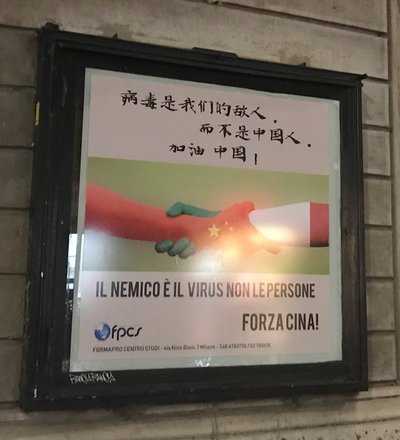Corona – another opportunity to live more attentively and to act more considerately
by Karl-Jürgen Müller

More than 20 years ago, in 1997, Stefan Winkle, professor emeritus for Hygiene at Jena and Hamburg, published a 1,500-pages comprising work entitled “Geisseln der Menschheit – Kulturgeschichte der Seuchen” (Scourges for mankind – cultural history of epidemics), third and last edition of the book, published in 2005, one year before the author’s death. Not only is the book a reference book for the medical study of the history of epidemics but also for the social, economic and political dimensions of contagious diseases. And it presents another evidence for the fact that one must judge with more scrutiny any unquestioned faith in progress that takes for granted man’s power over his destiny.
The corona virus and its aftermath remind mankind once again what the consequences are or may be of contagious diseases in all spheres of life and that man is not the absolute ruler of his destiny. Instead he is capable of doing a lot in order to avoid being only driven by outward sources but also being a considerate fashioner of his own life and contributing to avoiding or at least reducing suffering. This is true above all if he gathers sound information, if he possesses the resolute dedication to protect his health and life as well as that of his contemporaries and cooperates with others – always taking on responsibility for human lives. It is important to note though that he is dependant on functioning structures of stately order.
However, we must face reality. Corona does not have a destructive impact like pestilence, smallpox or similar often lethal diseases. However, even today the infection by the corona virus has rendered ten thousands of people ill and thousands died from the disease. The other damages to economy and society cannot be estimated yet; it seems likely that this is only the beginning of a worldwide epidemic (pandemic) and the stately structures necessary for survival do not exist in many countries or are often not sufficient. Poverty, misery and a defective social and health system are the enemies of human existence.
Most of Europe’s citizens are lucky to live in relatively well-functioning structures. It is true that these austerity measures in our health systems dictated by the OECD and oriented towards profitable privatisation have greatly undermined many sound and reliable structures, also those capable of dealing with emergency situations. Nevertheless we may rejoice to be living in a European instead of a Third-World state.
The history of epidemics has always made it clear that such emergency situations nourish old prejudices. This needs to be counteracted. In Milan, a region which has been affected by the virus extremely hard there is a poster with an appeal written in Chinese and Italian: “Il nemico e il virus, non le persone” (“The enemy is the virus, not the person”). In between there are two arms and hands to be seen holding each other. One arm shows the colours of the Chinese national flag, the other the colours of the Italian one. And the caption in the NZZ of 27 February reads: “In the Milan quarter Paola Scarpi a poster advertises cooperation in the fight against the virus”. This is a very beautiful idea.
Even now, the rather rapid worldwide proliferation of the corona virus infection demonstrates the dark sides of globalisation. But the Milano poster shows as well, what the humane alternative might be: mutual help. That would be the opposite of forming enemy stereotypes, waging trade wars and pursuing dumping-rivalries of an allegedly “free trade”; the opposite of sanctions, war drums and preparations for war – in short the opposite of war. Just as the many epidemics in man’s history the corona virus means a challenge for all of mankind. This fact basically justifies UN institutions like the World Health Organization (WHO) – in case they respect the equal rights of all nations, peoples and human beings and are not bound by special interests.
Does that sound a utopian idea? Actually it is nothing more than what conforms to man and his social nature. •
One way …
“The number of cases and fatalities [in Iran] is rising daily, but the health system is completely overstrained by the US sanctions and not equipped for an epidemic of this magnitude.
Completely unimpressed by human fates and the as yet unforeseeable consequences for the population, representatives of the regime change project in Iran such as Mark Dubowitz1 have shown themselves. Although Iran is unable to buy enough medical masks or even test kits to detect the virus in people with symptoms because of US sanctions, Dubowitz is pleased that the ‘corona virus has done what US economic sanctions could not: shut down non-oil exports‘. The Iranian Deputy Foreign Minister Seyed Abbas Araghchi called it ‘shameful and downright inhumane‘ that Dubowitz is cheering the spread of a ‘deadly virus‘.
Source: rt deutsch from 28 February 2020
1 Mark Dubowitz is the neoconservative CEO of the US think tank “Foundation for Defence of Democracy“
…or another?
“A new Swiss payment channel should enable companies to supply medicines to Iran despite the American sanctions. […] Humanitarian organisations have been complaining for months that American financial and trade restrictions have hindered the supply of important medicines and medical equipment. […] The Swiss Humanitarian Trade Arrangement (SHTA) offers for the first time an officially approved payment channel for Swiss companies to conduct business with medicines, food and other humanitarian goods. The mechanism, which was set up by the State Secretariat for Economic Affairs (Seco) in cooperation with the Ministry of Finance in Washington, is due to start work in a few weeks. A first test run took place at the end of January.“
Source: “Neue Zürcher Zeitung” of 15 February2020
(Translation Current Concerns)